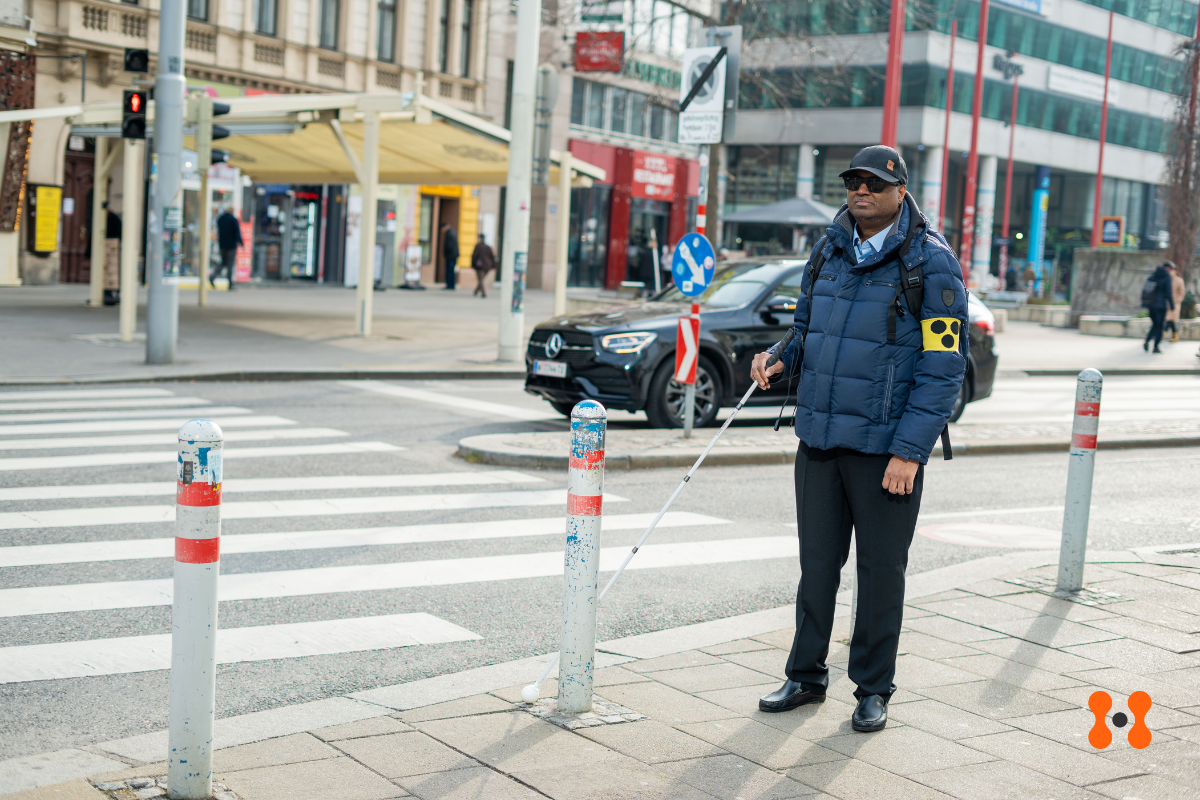Mental Health & Disability
Navigating Identity, Access, and Support
Mental health and disability are often discussed separately, yet for many, they intersect in complex and deeply personal ways. At Hope Tech, we know that navigating vision loss isn’t just about adapting to a new physical reality; it also means addressing emotional wellbeing, shifting identity, and accessing tools that support independence.
A visually impaired man stands at a pedestrian crossing in an urban area, holding a white cane. He is wearing a dark puffer jacket, black cap, sunglasses, and a yellow armband with black dots indicating visual impairment. Behind him are buildings, a black car, and several people walking.
The Overlap Between Disability and Mental Health
Mental health intersects with disability in more complex ways. According to the European Disability Forum, people with disabilities face a wide range of social conditions that negatively affect their mental health:
Lack of adequate support to live independently and on one’s own terms
Precarious employment – People with disabilities are 24.4 percentage points less likely to be employed in the EU compared to those without disabilities. The situation is especially difficult for women with disabilities, with only 48.3% in employment on average
Poverty and homelessness, which are closely tied to low employment rates and inadequate support systems
Discrimination and violence, from overt exclusion to subtle social and psychological barriers
Social and political exclusion, which further isolates individuals and contributes to mental distress
These realities are not due to the disability itself but rather to societal structures that fail to include and support all people.
Vision Loss and Identity
For those living with visual impairments, the emotional impact of sight loss often goes unacknowledged. Whether it comes gradually or suddenly, losing vision can feel like losing a part of one’s identity. Everyday tasks may suddenly require assistance. Long-held routines must change. And with this comes a grieving process, not only for what’s lost, but also for the roles, responsibilities, and freedoms that may no longer be accessible.
Certain tasks, such as driving, managing a household, or navigating public space, may require new approaches or support. This loss of autonomy can challenge a person’s sense of self-worth and independence, particularly when societal barriers make accessing alternatives harder than it should be.
Mental Health Conditions as Disabilities
The way we define disability is also evolving. In many countries, mental health conditions such as major depressive disorder, bipolar disorder, and obsessive-compulsive disorder are now recognized as disabilities under law. The Americans with Disabilities Act (ADA), for instance, defines a disability as any physical or mental impairment that substantially limits one or more major life activities.
This legal recognition is a step forward. But in reality, many people living with mental health conditions still face stigma, limited access to care, and a lack of accommodations. This is especially true when mental health intersects with other aspects of disability, compounding barriers to treatment and inclusion.
Why Choice and Access Matter
There’s no one-size-fits-all solution when it comes to assistive technology. People with vision loss may need different tools at different times, based on their surroundings, lighting, or the progression of their condition. Technology like Sixth Sense is designed to be part of a broader toolkit, not to replace existing aids, but to complement them. Our goal is to make real-world navigation easier, safer, and more intuitive.
Ultimately, access to assistive tools and supportive environments is not just about function. It’s about dignity, identity, and self-determination. When people can move through the world on their own terms, mental health and wellbeing follow.
Support Resources
If you or someone you know is navigating sight loss or mental health challenges, there are communities and organisations that can help. Here are a few starting points for support in Austria and the UK:
Austria
Hilfsgemeinschaft – A longstanding support group for people with visual impairments, offering peer connection, advocacy, and resources: hilfsgemeinschaft.at
Blindenverband – The Austrian Federation of the Blind and Partially Sighted provides services, events, and practical assistance: blindenverband.at
Seh-Netz – A comprehensive information hub for visually impaired individuals, their families, and allies: seh-netz.info
Crisis Hotlines – If you're in immediate need of emotional support, a list of crisis facilities is available through the Austrian government: gesundheit.gv.at
United Kingdom
Sight Support West of England – Local services and outreach supporting independence and wellbeing: sightsupportwest.org.uk
Eye Matter – A peer support community of people with sight loss: eyematter.org.uk
Glaucoma UK – Resources, education, and support for those affected by glaucoma: glaucoma.uk
Macular Society – For people with macular degeneration and their families: macularsociety.org
Wiltshire Sight – Offers advice and tools for living with sight loss: wiltshiresight.org
VICTA – Support for children and young adults with visual impairments: victa.org.uk
Keratoconus Group – A UK-based charity offering peer-led information and support: keratoconus-group.org.uk
Mental wellbeing and disability must be talked about together, because the more we recognize their connection, the better we can build a world where no one is left behind. At Hope Tech, we are committed to supporting that change through design, dialogue, and inclusion.

